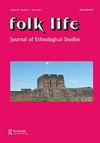布赖恩·斯托威尔博士RBV, TH (1936-2019)
IF 0.1
4区 社会学
0 FOLKLORE
引用次数: 0
摘要
我们首先要记住托马斯·布莱恩·斯托维尔,他对马恩语复兴的贡献,同时也是一位优秀的音乐家和歌手,一位作家、教师、广播员等等。他是最聪明的头脑和最慷慨的精神,是一个“Manninagh dooie”,一个真正的Manxman。1936年9月6日,布莱恩出生于马恩岛道格拉斯,就读于默里路和道格拉斯高中,在那里他取得了优异的学业成绩。1953年1月,在学校里,他读到道格·法格尔的一篇文章,讲述了这种语言是如何被抛弃的,这篇文章激励了布莱恩开始学习。布赖恩回忆起当时对马恩岛的强烈歧视,尤其是来自马恩岛老年人的歧视,他们将其与贫困和自卑联系在一起。他没有气馁,加入了法格尔和其他人的行列,他们正在收集当时仅存的少数以马恩岛为母语的人的录音。他的周末充满了长时间的口语,大约9个月后,他觉得自己能说得相对流利。布莱恩职业生涯的大部分时间都是在物理学上度过的,他最初在利物浦大学学习物理学。毕业后,他做了一名他讨厌的学校教师,两年后离开,前往位于柴郡卡彭赫斯特的英国原子能管理局工作。他后来在利物浦理工学院任教,在那里他获得了应用物理学博士学位,并成为了系主任。有一段时间,他对自己在马恩岛的研究做了敏感的记录,因为他知道自己是世界上唯一能完全理解这些研究的人。在默西塞德郡期间,他觉得自己从未离开过马恩岛,因为他与朋友保持联系,并继续说这种语言,为文化生活做出贡献。他在利物浦演讲并教授爱尔兰语,再次面对巨大的偏见。也正是在利物浦,他遇到并激励了马恩岛的学生Phil Gawne和Adrian Cain,他们两人继续在马恩岛语言社区发挥积极作用,主要是通过他们在马恩岛遗产基金会(现为文化先锋基金会)担任马恩岛语言发展官,以及通过Mooinjer Veggey的工作,Brian后来将担任该基金会的董事会成员。布赖恩是一个对自己的学识轻描淡写的人,他的谦逊只会让他对自己的技能、知识和才华产生更深的尊重。家人和朋友形容他是一个坚强、独立的人,他的叛逆性格伴随着极大的幽默感。布莱恩在与帕特的第一次婚姻中抚养了他的两个孩子,《民间生活2019》,第57卷,第1期,80-83页https://doi.org/10.1080/04308778.2019.1589024本文章由计算机程序翻译,如有差异,请以英文原文为准。
Dr Brian Stowell RBV, TH (1936–2019)
We remember Thomas Brian Stowell first and foremost for his contribution to the revival of the Manx language, but also as a fine musician and singer, a writer, teacher, broadcaster and so much more. The brightest of minds and the most generous of spirits, he was a ‘Manninagh dooie’, a true Manxman. Born in Douglas, Isle of Man on 6 September 1936, Brian attended Murray’s Road and Douglas High School, where he excelled academically. It was at school that he first became interested in Manx, having read an article by Doug Fargher in January 1953 which talked about how the language was being abandoned and which inspired Brian to start learning. Brian recalled the strong discrimination against Manx at the time, particularly from older Manx people, who associated it with poverty and inferiority. Undeterred, he joined Fargher and others who were collecting recordings of the then few remaining native Manx speakers. His weekends were filled with long hours of the spoken language, and after about 9 months, he felt he could speak it relatively fluently. The main part of Brian’s working life was spent with physics, which he first studied at the University of Liverpool. After graduation, he worked as a school teacher, which he hated, leaving after 2 years for a post at the UK Atomic Energy Authority at Capenhurst in Cheshire. He later taught at Liverpool Polytechnic, where he gained a doctorate in applied physics and became head of department. At one time, he kept sensitive notes about his research in Manx, in the knowledge that he was the only person in the world who could understand them fully. During his time on Merseyside, he felt he never left the Isle of Man, as he kept in contact with friends, and continued speaking the language and contributing to cultural life. He spoke and taught Irish in Liverpool, again in the face of great prejudice. It was in Liverpool, too, that he met and inspired Manx students Phil Gawne and Adrian Cain, both of whom continue to play an active role in the Manx language community, mainly through their role as Manx Language Development Officer for the Manx Heritage Foundation, now Culture Vannin, on whose board Brian would later sit, and through the work of Mooinjer Veggey. Brian was someone who wore his learning lightly, whose modesty only engendered deeper respect for his skill, knowledge and talent. Described by family and friends as a strong, independent-minded person, his rebellious character was accompanied by a great sense of humour. Brian raised his two children from his first marriage to Pat, FOLK LIFE 2019, VOL. 57, NO. 1, 80–83 https://doi.org/10.1080/04308778.2019.1589024
求助全文
通过发布文献求助,成功后即可免费获取论文全文。
去求助
来源期刊
CiteScore
0.30
自引率
66.70%
发文量
17
期刊介绍:
Folk Life: Journal of Ethnological Studies is a journal devoted to the study of all aspects of traditional ways of life in Great Britain and Ireland. The journal publishes original, high quality, peer-reviewed research in the form of unsolicited articles, solicited papers (which are usually selected from those read at the Society"s annual conference) and of members" papers (which are usually short reports of work in progress). Work published in Folk Life may include, for example, papers dealing with the traditional ways of life of other countries and regions, which may be compared to or contrasted with those of Great Britain and Ireland.

 求助内容:
求助内容: 应助结果提醒方式:
应助结果提醒方式:


